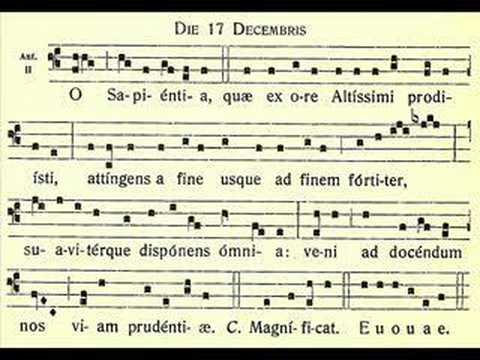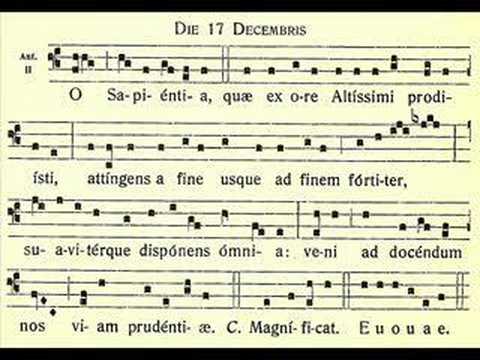From at least the eighth century the antiphon before and after the Magnificat at Vespers (Evening Prayer), for the seven days leading up to Christmas Eve, has greeted Christ with a title starting with “O”. These became the basis of the popular carol “O come, O come, Emmanuel”. The initials, when read backwards, form the Latin “Ero Cras” which means “Tomorrow I come.”
They are now also used, in shorted form, in the Alleluia verses before the days’ Gospel readings.
Each day an O Antiphon could be used for prayer and reflection. These could form the basis of an Advent service with readings, music, and singing. Or of art, banners, or other ways of enhancing the worship environme symbolically. The carol “O come, O come, Emmanuel” and the Magnificat could form significant features in this.
O wisdom, coming forth from the Most High, filling all creation and reigning to the ends of the earth; come and teach us the way of truth.
Amen. Come, Lord Jesus.
O Sapientia,
quae ex ore Altissimi prodiisti,
attingens a fine usque ad finem fortiter,
suaviterque disponens omnia:
veni ad docendum nos viam prudentiae.
Ecclesiasticus 24.3-9 Proverbs 1:20; 8; 9 and 1 Corinthians 1:30
O come, thou wisdom from on high
Who madest all in earth and sky,
Creating us from dust and clay:
To us reveal salvation’s way.
Rejoice! Rejoice! Emmanuel
shall come to thee, O Israel.

O Antiphons reflection 1
O Antiphons reflection 2
This is a reposting.




So what does the ‘O’ mean? It is never clear how to translate it for British Sign Language and it often gets dropped or an O is signed but this doesn’t have meaning.
“An exclamation used in calling or directly addressing a person or personified object; also, as an emotional or impassioned exclamation expressing pain, grief, surprise, desire, fear, etc.” source
For ever, O Lord, thy word is settled in heaven. –Ps.cxix. 89.
O how love I thy law ! it is my meditation all the day. –Ps. cxix. 97.
O Christmas tree…
O Canada…
The ‘O’ in this case is a poetic apostrophe. It is a figure of speech in which the poet addresses an absent person or an abstract idea. Or even a thing. One still finds something like it in use in Brazilian Portuguese.
That is helpful. Thanks for the reply. British Sign Language includes facial and body expression as well as sign so depending on what the ‘O’is expressing, it will influence the way it is signed to relay the meaning of the exclamation.
Thanks for the heads-up, Bosco – medieval Latin poetry is beautiful in its own way, with rhyme, and a stress pattern quite unlike classical Latin, which was beholden to Greek models.
Prudentius’s ‘Ex Corde Natus’ always comes to mind at this time of year as well.
arrgh- I meant ‘Corde natus (ex parentis)’. Nice thing is it scans fine for the familiar tune.
Corde natus ex parentis
Ante mundi exordium
A et O cognominatus,
ipse fons et clausula
Omnium quae sunt, fuerunt,
quaeque post futura sunt.
Saeculorum saeculis.